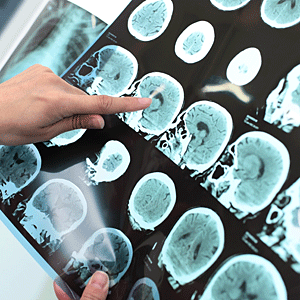
Shutterstock
The US Food and Drug Administration has approved a radioactive diagnostic tracer for use with positron emission tomography (PET) of the brain in adults being evalued for Alzheimer's disease and dementia.
The F18 flutermetarmol injection, is the second brain imaging drug to get FDA approval. The first, florbetapir F18 injection was approved last year.
Both drugs are radioactive diagnostic agents that are injected into the bloodstream, where they cross the blood-brain barrier and selectively bind to amyloid plaques.
A positive scan does not establish a diagnosis of Alzheimer's or other dementia, but a negative scan means that there is little or no ß-amyloid accumulation in the brain and that the cause of the dementia is probably not due to Alzheimer's.
Important tools
Dr Shaw Chen, the deputy director in the office of drug evaluation at the FDA's centre for drug evaluation and research, said in a news release: "Many Americans are evaluated every year to determine the cause of diminishing neurologic functions, such as memory and judgment, that raise the possibility of Alzheimer's disease."
"Imaging drugs lprovide physicians with important tools to help evaluate patients for Alzheimer's and dementia."
The FDA said the latest drug's effectiveness was established in two clinical studies that included 384 participants with a range of cognitive function who were injected with the tracer and then scanned.
The images were interpreted by five independent readers masked to all clinical information and some scan results were also confirmed by autopsy.
Trained readers
The study results demonstrate that flutemetamol correctly detects ß-amyloid in the brain, said the FDA.
The results also confirmed that the scans were reproducible and that trained readers could accurately interpret them. Flutemetamol's safety was established in a total of 761 participants.
Safety risks associated with flutemetamol include hypersensitivity reactions and the risks associated with image misinterpretation and radiation exposure. Common adverse effects include flushing, headache, increased blood pressure, nausea and dizziness.
Photo: Tomography scan from Shutterstock
The F18 flutermetarmol injection, is the second brain imaging drug to get FDA approval. The first, florbetapir F18 injection was approved last year.
Both drugs are radioactive diagnostic agents that are injected into the bloodstream, where they cross the blood-brain barrier and selectively bind to amyloid plaques.
A positive scan does not establish a diagnosis of Alzheimer's or other dementia, but a negative scan means that there is little or no ß-amyloid accumulation in the brain and that the cause of the dementia is probably not due to Alzheimer's.
Important tools
Dr Shaw Chen, the deputy director in the office of drug evaluation at the FDA's centre for drug evaluation and research, said in a news release: "Many Americans are evaluated every year to determine the cause of diminishing neurologic functions, such as memory and judgment, that raise the possibility of Alzheimer's disease."
"Imaging drugs lprovide physicians with important tools to help evaluate patients for Alzheimer's and dementia."
The FDA said the latest drug's effectiveness was established in two clinical studies that included 384 participants with a range of cognitive function who were injected with the tracer and then scanned.
The images were interpreted by five independent readers masked to all clinical information and some scan results were also confirmed by autopsy.
Trained readers
The study results demonstrate that flutemetamol correctly detects ß-amyloid in the brain, said the FDA.
The results also confirmed that the scans were reproducible and that trained readers could accurately interpret them. Flutemetamol's safety was established in a total of 761 participants.
Safety risks associated with flutemetamol include hypersensitivity reactions and the risks associated with image misinterpretation and radiation exposure. Common adverse effects include flushing, headache, increased blood pressure, nausea and dizziness.
Photo: Tomography scan from Shutterstock




 Publications
Publications
 Partners
Partners















